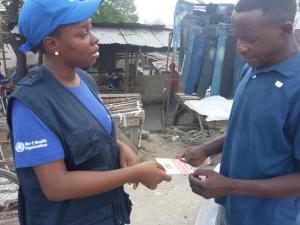Countering myths and misconceptions about cholera in Katavi
Tanganyika District, Katavi Region - Cholera epidemic is a recurrent disease in developing countries with poor environmental sanitation and inadequate supply of potable water. Wrong perception and myths surrounding the real causes of cholera disease can hinder acceptance and accessibility to launch effective operational response to affected communities during an outbreak.
In some communities for example, magico-religious factors, witchcraft, eating soil, god’s will and evil air are believed to be responsible for cholera outbreaks. “We have had challenges controlling and preventing recurring cholera outbreaks in communities that live along the shores of Lake Tanganyika for a long time,” says, Mr. Bahati Mwailafu, the Risk Communication Community Engagement Officer in Katavi.
Fishing communities along Lake Rukwa shore in Tanganyika district have been especially prone to Cholera outbreaks. Pastoralists and fishing communities set sparse households along the sloped shores, using shallow, in situ pit latrines and drawing domestic water from the lake and shallow wells near households.
When Cholera was declared in Kapalamasenga, one of the wards in Tanganyika district, majority of community members believed witchcraft to be the cause of disease and deaths. “A visitor from Kigoma Region was chased away from the two affected villages because of this belief”, said Mwailafu.
The Government of Tanzania reported the outbreak on 18 April 2022 and by 26 June 2022, a total of 211 cases and 6 deaths were reported from Tanganyika district. This necessitated the World Health Organization to deploy a team of experts to work with the regional and district health management teams in Tanganyika district to conduct risk assessment, training of frontline responders and provide WASH items and supplies to affected communities.
“In the affected communities, we observed that pit latrines were dangerously near to the water sources,” said Michael Habtu, WHO WASH expert who participated in the risk assessment.
“Some of the poor hygiene practices stem from the local traditional beliefs,” explains Mwailafu. “In some communities for example, it is a taboo for younger men and women to share a toilet with the head of the household. As a result, open defecation is very common despite the nationwide campaign to end open defecation. Among fishing communities, Cholera is regarded to be a “bad wind” that comes and goes with the rainy seasons”, he adds.
As part of the response, WHO supported training of 98 community health workers and 48 community leaders from 4 Wards and 17 villages on Cholera transmission, signs and symptoms and prevention measures and how they can play a role in promoting use of latrines, hand hygiene and consumption of safe drinking water.
“Community health workers and community leaders are key change agents and gate keepers to reaching communities with correct information about the causes of recurring Cholera outbreaks and what needs to be done to end them”, said Jerry Mlembwa, the Risk Communication and Community Engagement Officer from WHO.
In addition, 11 environment and health committees (a total of 62 members) were oriented and deployed to support Cholera response activities in their localities including distribution of 60,000 brochures and posters in six affected and at-risk wards (Isengule, Kasekese, Ikola, Karema, Sibwesa and Kapalamsenga).
“I am happy to have received this training and tools that will help me tackle myths and misconceptions about the source of Cholera in our communities. As a leader, I am obliged to protect my people from such preventable disease,” said Beatus Urio, a village leader from Kapalamsenga.
“We are grateful for the WASH supplies (pool chlorine testers, chlorine granules, bleach, reusable plastic aprons, heavy duty rubber gloves, buckets and Jerry cans) that we have received from WHO. We are confident that this timely support will complement regional efforts to contain the spread of Cholera in the region,” said Mwailafu.
Following activation and deployment of community leaders, community health workers and Environment and Health Committees, a joint supportive supervision mission was organized to assess and support the community-led response operations.
Mr Jumanne Saidi Kabaga, an 80-year-old community leader was among the trained champions who participated in the monitoring visit. “I have been doing this work since 1977. I ride my bicycle up and down the hills to educate my community how to stay safe from Cholera and many other diseases. The key message we are promoting now is construction and use of handwashing facilities, improved latrines, food safety and water treatment” he added.
Despite his age, Mr Kabaga is well accepted and respected in his community. “I am still healthy and strong to move around to educate my people. I have no challenge interacting with the younger people who are my fellow champions and future leaders. I consult them whenever I need help or clarification on some issues,” he adds smiling.
Intensified community sensitization in Tanganyika district supported by WHO and partners has contributed to an increase of 1175 newly constructed improved latrines, and 2018 handwashing facilities during the period of August to September 2022.
Like in other countries of the world, recurrent episodes of cholera in Tanzania can be stopped if the predisposing factors and aetiology are well understood. Additionally, efforts at ameliorating and controlling the epidemic must translate to sustainable practices. Countering myths on the cause of cholera and understanding the standard infection prevention and control measures are also key to developing and maintaining long lasting solution to continuous outbreaks.
Email: kileon [at] who.int
Tel: +255 755 551 804
Communications and Media Officer
WHO Country Office, United Republic of Tanzania
Tel:+255 22 2111718/2113005
Mobile:+255 743 958599
Email: mwijarubim [at] who.int
